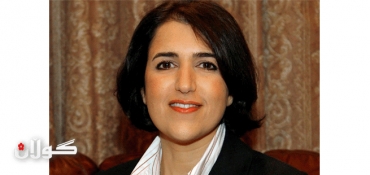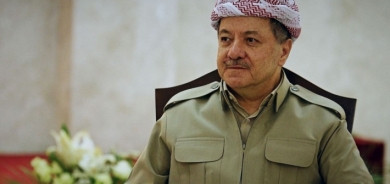Bayan Sami Abdul Rahman to RUDAW: KRG Representative in UK: Britain Very Supportive of Kurdistan Region
November 30, 2013
From Media

Bayan Sami Abdul Rahman, who represents the Kurdistan Regional Government (KRG) in the United Kingdom, says that Kurdistan’s growing importance and the economic opportunities there have made her job of representing a non-sovereign government easier. “The relationship sees a lot of interest in terms of trade and investment,” she told Rudaw in an interview. Abdul Rahman also recalls the difficulties when she represented the Erbil-based Kurdistan Democratic Party (KDP) in London, while the Patriotic Union of Kurdistan (PUK) maintained its own representative, who reported to the administration in Sulaimani. Here is an edited transcript of her interview, in which she discusses London-KRG relations, the role of the KRG representation and the way the British media cover Kurdish affairs.
Rudaw: How do you evaluate relations between Britain and the KRG?
Bayan Abdul Rahman: The relationship is good and detailed, by which I mean it is not just superficial. It is an expanding relationship too, growing into new areas, both geographically and into new sectors. We also focus on our relations with British parliamentarians.
The relationship sees a lot of interest in terms of trade and investment -- although more trade at this stage. But trade is the way to open the door. As people increase their knowledge of the market, investment will follow.
In higher education, many Human Capacity Development Program (a Kurdish government scholarship program) students choose to come to the UK. I think Britain is the biggest single recipient of Kurdish scholarship students and many British academic institutions are developing relationships with their counterparts in the KRG.
There are conferences organized by the UK in the KRG, where many speakers are British. With great engagement -- and very recently – UKTI (UK Trade and Investment) and the KRG organized a conference in London for Kurdish companies coming to Britain. Britain is very interested in Kurdistan and recently thought, "Hang on, there are some very big companies and even wealthy individuals in the KRG, why don't we invite them to invest in big projects in the UK?"
In terms of culture, much of the engagement is through the Kurdish diaspora. We (the KRG office) don't necessarily initiate cultural events, but we sponsor, we encourage, we put people in touch. We have lots of connections. For example, through my work I have built up a lot of contacts in the film industry. With the London Kurdish Film Festival, which is organized by the diaspora community, they came to us for sponsorship. We sponsored them and we put them in touch with our contacts.
Rudaw: One notable omission from the relationship is the absence of direct flights between London and Kurdistan. Why do you think this is? Is it political, a product of British relations with the Baghdad government?
Bayan Abdul Rahman: Maybe, but it is probably more practical. There are no direct flights (from London) to Baghdad either. The issue is more practical than political.
It has to be a commercial decision -- whether it is a Kurdish airline flying from Erbil or Sulaimani to London, or a British airline flying the other way, they need to do the business analysis.
Another problem is that Britain has a higher level of security than other European countries and the demands on international airports are particularly high. The (British) All-Party Parliamentary Group on Kurdistan has engaged in discussions on this.
Rudaw: In Britain's dealings with the KRG, do you feel that London feels guilty, or is trying to make up for, British neglect of the region during the Saddam Hussein era?
Bayan Abdul Rahman: No, I think the British are hardnosed businesspeople. They may be reminded by Kurdish businesspeople that your country (Britain) did this or that to us. There is a mixed history of British involvement in Kurdistan. Take Winston Churchill: At one time, he appeared to be advocating a Greater Kurdistan, and at another time he was ordering the Royal Air Force to bomb Kurdistan, possibly with chemical weapons. Even someone like Winston Churchill has a mixed record.
But we are very happy that the more recent record has been more positive. In 1991, when John Major was prime minister, he was instrumental in Britain, the US, France and Turkey eventually establishing safe havens and a no-fly zone (over Iraqi Kurdistan). This changed things. It was a turning point in our history. Again, in 2003, Britain was involved in the liberation (the removal of Saddam and his government) and has taken a lot of pressure for that. So, even if I don't remind the British, Kurdish businesspeople do.
Rudaw: In your dealings with the British government do you feel any tension vis-a-vis London’s relations with the Baghdad government and the KRG?
Bayan Abdul Rahman: There are no tensions. There was a period a few years ago, when Britain still had troops in Iraq, and major British oil companies were trying to sign oil deals in the south of Iraq -- BP and Shell. But it was not tension. We have always had a good relationship. There was some difference for a short period. Perhaps the British were trying, very slightly, to distance themselves from the KRG, and certainly from our office here.
Overall, certainly today, I don't feel that tension at all. Britain is very clear in that it supports the constitution of Iraq and the unity of Iraq but also supports Iraq to be democratic and is very supportive of what is happening in the Kurdistan Region.
Rudaw: How are relations between the KRG representation in London and the Iraqi embassy? What control does the Iraqi embassy exercise over you?
Bayan Abdul Rahman: Before we get to the embassy level, the Department of Foreign Relations of the KRG has a relationship with the Iraqi foreign ministry in Baghdad and they liaise on certain issues.
In terms of embassy relations, since I have been the representative, after liberation, we have always had good relations. The Iraqi embassy was closed for a period of course, in the 80s, and people like me and others in the diaspora held protests outside the (Iraqi) embassy, because it was Saddam's embassy.
Since it re-opened, around the time that I became representative, we've always had good relations. The previous (Iraqi) ambassador, Dr Salah Al Shaikhly, was very friendly towards us. The current ambassador, only recently appointed, is actually Kurdish, Faik Nerweyi.
It is a good and respectful relationship. We see no gain in disrespecting one another. So, if we need help, we don’t hesitate in asking, and if they can help they do. Or if they can't, they’re very honest, and vice-versa. On consular services, if the issue is in the KRG, they will say, “Go to the KRG representation, where it will be dealt with more quickly.”
But I want to make it clear that our relationship is good not just because the Iraqi ambassador is Kurdish, but with the charge d’affaires, who is an Arab gentleman, and the previous Iraqi ambassador, relations were always good.
Rudaw: What are the practical difficulties of representing a regional government rather than a sovereign state?
Bayan Abdul Rahman: That reminds me that, in connection with your previous question, I should also say that we have great relations with the other regional governments – Catalonia, Quebec, Flanders and others. Taiwan, I don’t know if you call that a region or a state, but they are in a grey area themselves. We have good relations with them all.
I don't miss out much not representing a sovereign country. Of course, I have not presented my credentials to Her Majesty the Queen or the Court of St James, and there are some diplomatic events that I’m not invited to because I don’t have diplomatic status or I’m not an ambassador. But in practical terms, everything gets done. Diplomatic niceties and relations are important, but so far there has not been a situation where I have thought, “If only I was an ambassador, or the KRG was a sovereign state.” We have always found a way round it, and so have the British. Perhaps that’s because it is in Britain's interest. If it was not, they might have used (the KRG’s diplomatic status) as an excuse.
Rudaw: What were the problems that arose when there were two representatives from the dual governments of Kurdistan before unification?
Bayan Abdul Rahman: For most of that time, my predecessor was in the post. But even for the short time that I experienced, it was not an ideal situation. But really the operations were very small. It was a different scale, and we had different relations with Britain. The KRG was not recognized the way it was after the (Iraqi) constitution (was adopted in 2006 and the KRG was unified).
At the time that I became representative, I know that the PUK representative was uncomfortable, and so was I. I was glad that this was resolved a short time later. But it was the same in Washington, and in some other countries.
Rudaw: Some critics have said that the KRG representatives are just a product of political dealings between the parties in the KRG and that posts are awarded on political lines. How do you respond.
Bayan Abdul Rahman: There are different systems around the world. In some countries, ambassadors are civil servants and apolitical. In other countries, they are political appointments. The KRG has chosen the latter system. But both systems have their advantages and disadvantages. One advantage of being a political appointee is that it gives you more clout in the country you're in. So, I'm KDP and I’ve been in the KDP leadership since the end of 2011. But the fact that I'm KDP and have channels to one of the main governing parties gives me and my office some political clout here in the UK. That is one advantage. But there are also disadvantages, and people are right to criticize. There are different systems, and our system is not out of the blue. Other countries follow this.
Rudaw: Finally, as a former journalist how you think the KRG is covered in the British press.
Bayan Abdul Rahman: I find it frustrating that the Kurdistan Region is not really covered enough by the British media, but I think that if you spoke to most ambassadors in London they would say the same, that their country is only covered when something negative happens.
From my perspective, the British media should take much more note of Kurdistan because we are emerging as an influential player, not just in Iraq but in the wider region. More and more, political decision-makers are recognizing that, and the media will soon. In fact, the respected, more authoritative journalists recognize that. But it is the younger journalists in a hurry to get out a wire report who tend to cover things more black and white. And luckily, fortunately, Kurdistan isn’t a terrorist state. Things are, touch wood, going very well in Kurdistan, so there’s nothing to report. I mean that from their perspective.
RUDAW











